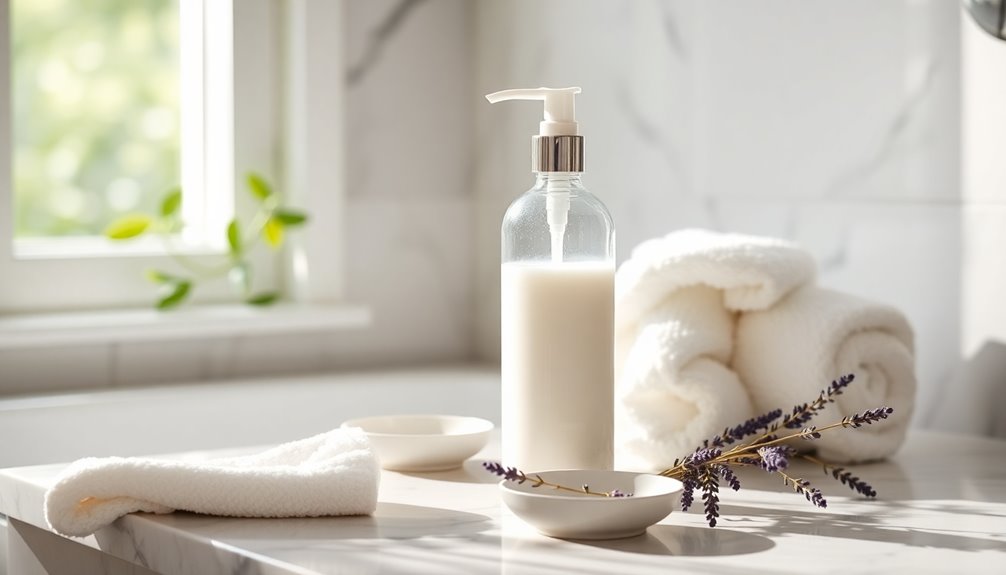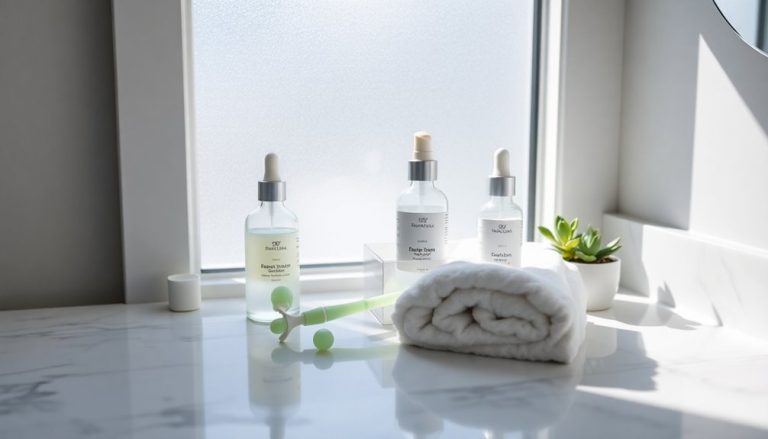To care for your sensitive skin, start with a gentle cleanser. Look for fragrance-free and hypoallergenic products that soothe without irritation. Follow up with a soothing moisturizer, applying it in gentle, upward strokes to restore hydration and support your skin barrier. Finally, don't forget to protect your skin with a broad-spectrum sunscreen of at least SPF 30 every day. Reapply often, especially if you're sweating or swimming. By sticking to these steps, you'll maintain your skin's health while minimizing reactions. There's even more to discover about how to enhance your skincare routine effectively.
Key Takeaways
- Start with a gentle cleanser that is fragrance-free and hypoallergenic to avoid irritation.
- Follow up with a soothing moisturizer containing hydrating ingredients like aloe vera or chamomile.
- Always apply broad-spectrum sunscreen with SPF 30 or higher to protect sensitive skin from UV damage.
- Use lukewarm water for cleansing and pat dry with a soft towel to prevent irritation.
- Monitor skin reactions to products and avoid known irritants to maintain skin health.
Choose a Gentle Cleanser

When caring for sensitive skin, you should always choose a gentle cleanser. This is crucial because harsh ingredients found in many cleansers can irritate your skin, leading to redness, dryness, or breakouts. Look for products labeled "fragrance-free" and "hypoallergenic," as these are less likely to provoke a reaction. Creamy or gel-based formulas often work well for sensitive skin types.
As you browse, pay attention to the ingredient list. Opt for cleansers containing soothing ingredients like aloe vera, chamomile, or glycerin. These can help calm your skin while effectively removing dirt and makeup. Avoid alcohol and sulfates, as these can strip your skin of its natural oils and exacerbate sensitivity. Additionally, using a cleanser with Vitamin C can enhance skin radiance and offer protective benefits against environmental stressors.
When you cleanse, use lukewarm water instead of hot, as extreme temperatures can worsen irritation. Gently massage the cleanser onto your skin in circular motions, and rinse thoroughly to ensure no residue is left behind.
After cleansing, always pat your skin dry with a soft towel, avoiding any rough fabrics. Taking these steps will help maintain your skin's health and keep it feeling comfortable. Additionally, incorporating micellar water into your routine can provide a gentle yet effective way to cleanse without causing irritation.
Hydrate With Soothing Moisturizer
A soothing moisturizer is essential for keeping sensitive skin hydrated and comfortable. After cleansing, this step becomes crucial in restoring moisture and reinforcing your skin's natural barrier. Incorporating a coconut oil moisturizer can provide additional benefits due to its natural hydration properties.
Look for moisturizers that contain calming ingredients like aloe vera, chamomile, or oatmeal. These ingredients not only provide hydration but also help to reduce redness and irritation.
When applying your moisturizer, use gentle, upward strokes. Avoid rubbing your skin harshly; instead, let the product absorb slowly. This practice allows your skin to benefit fully from the soothing properties of the moisturizer.
Aim for a product that's fragrance-free and formulated specifically for sensitive skin, as added fragrances can sometimes trigger reactions.
You might want to choose a thicker cream for nighttime use, allowing it to deeply penetrate while you sleep. During the day, a lighter lotion may feel more comfortable, especially if you're layering other products.
Pay attention to how your skin reacts after each application. If you notice any irritation, switch to a different product that's gentler. By maintaining this hydration routine, you'll keep your sensitive skin looking healthy and feeling balanced. Additionally, consider incorporating a collagen-infused face cream, as it can enhance skin elasticity and overall appearance.
Protect With Sunscreen

Shielding your skin from harmful UV rays is vital, especially for sensitive skin that can easily become irritated. Using sunscreen daily is a non-negotiable step in your skincare routine. Make sure to choose a broad-spectrum sunscreen with SPF 30 or higher. This protects against both UVA and UVB rays, which can cause sunburn, premature aging, and even skin cancer.
When applying sunscreen, don't skimp on the amount. You need about a nickel-sized dollop for your face and more for body coverage. Reapply every two hours, or more often if you're swimming or sweating. Remember, using sunscreen with SPF 50 can provide even greater protection against UV rays.
Here's a quick reference table for choosing the right sunscreen for your sensitive skin:
| Type of Sunscreen | Benefits |
|---|---|
| Physical (Mineral) | Gentle on skin, reflects UV rays |
| Chemical | Lightweight, absorbs UV rays |
| SPF 30 or higher | Adequate protection for sensitive skin |
| Water-Resistant | Lasts longer during swimming/sweating |
Frequently Asked Questions
Can I Use Makeup With Sensitive Skin?
Isn't it frustrating when your skin reacts negatively? You can use makeup with sensitive skin, but choose products carefully. Look for hypoallergenic, fragrance-free options, and always patch test before applying to avoid irritation.
How Often Should I Exfoliate Sensitive Skin?
You should exfoliate sensitive skin once a week. This frequency helps remove dead skin cells without causing irritation. Always choose a gentle exfoliant, and listen to your skin's reactions to adjust as needed.
Are There Specific Ingredients to Avoid?
Yes, you should avoid certain ingredients like alcohol, fragrance, sulfates, and harsh exfoliants. These can irritate your skin and cause redness or discomfort. Always check labels to ensure your products are safe for your skin type.
Is It Safe to Use Retinol on Sensitive Skin?
Using retinol on sensitive skin can be tricky. You might experience irritation initially, but with gradual introduction and proper moisturization, it could work for you. Always patch test first—your skin's reaction will guide you.
How Can I Identify My Skin Type?
To identify your skin type, observe how your skin feels after cleansing. If it's tight, you might have dry skin. If it's shiny, you likely have oily skin. Combination skin shows both signs, while sensitive skin reacts easily.
Conclusion
By choosing a gentle cleanser, hydrating with a soothing moisturizer, and protecting your skin with sunscreen, you're crafting a cocoon of comfort for your sensitive skin. Imagine the soft touch of a feather caressing your face, the coolness of a summer breeze on your cheeks, and the warm embrace of the sun, all while your skin feels nourished and safe. Embrace these simple steps, and let your skin bloom with the gentle care it deserves.




